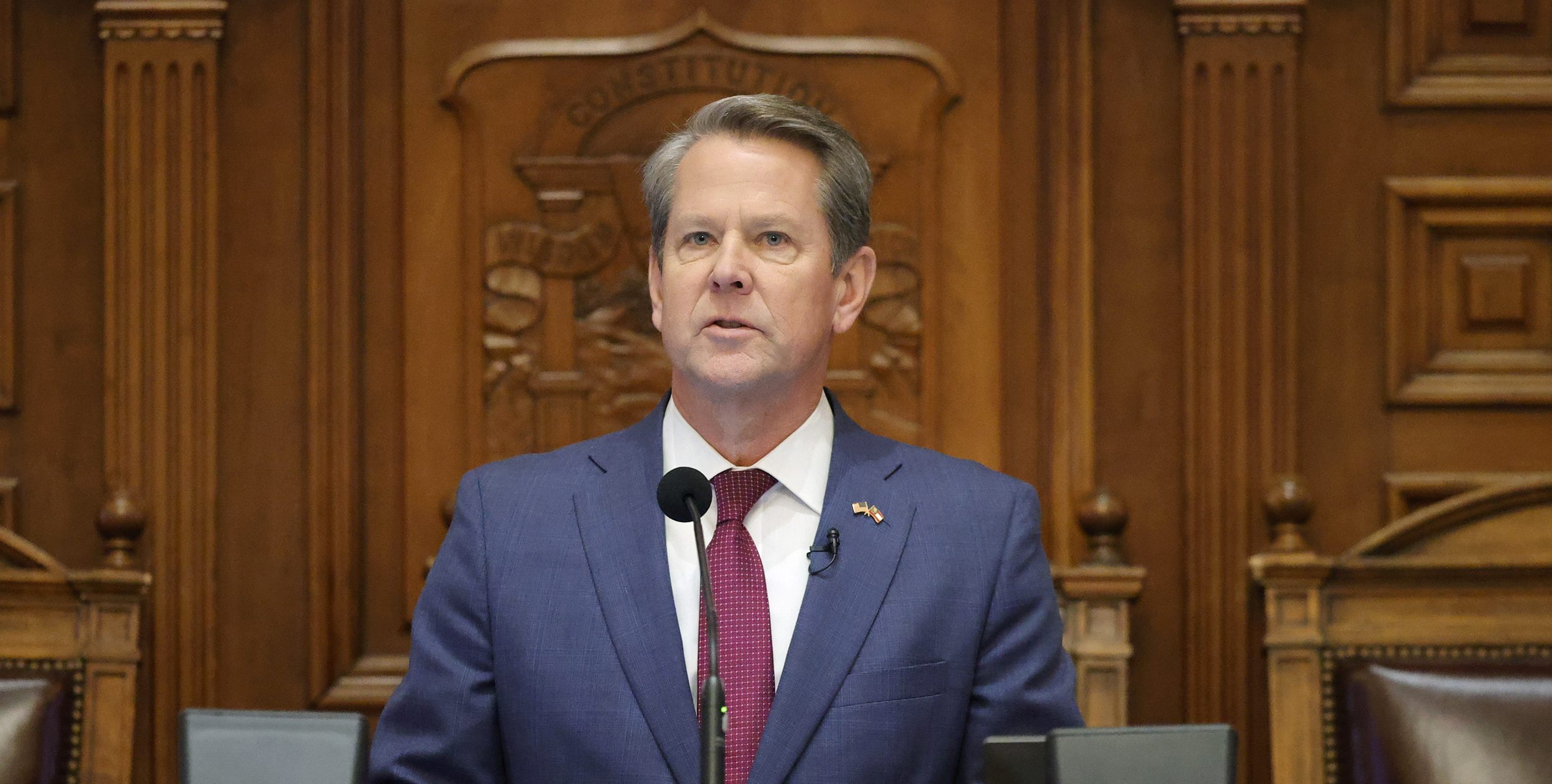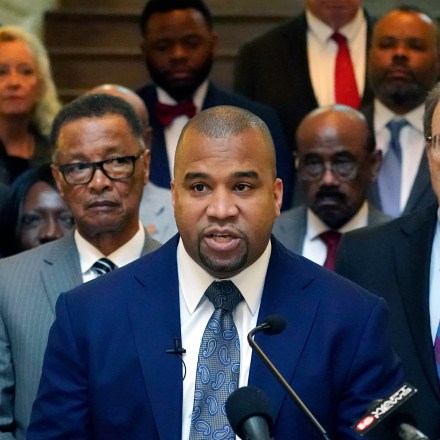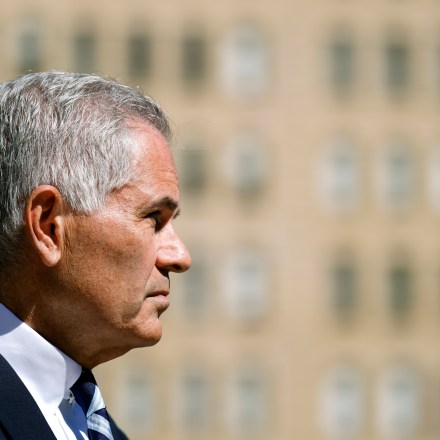Four elected prosecutors filed suit against the state of Georgia on Wednesday to stop a new law that gives appointees of the state’s Republican governor the power to remove elected district attorneys from office. Georgia Gov. Brian Kemp signed the bill into law in May.
“This is a trend that we’re seeing across the country of state governments that don’t like how local communities want to address concerns about public safety,” said Josh Rosenthal, legal director at Public Rights Project, which is working on the suit. “When local communities are making choices that these conservative state governments don’t like, state governments aren’t respecting the will of the voters. They’re taking that power away from local communities.”
“When local communities are making choices that these conservative state governments don’t like, state governments aren’t respecting the will of the voters.”
The Georgia bill is one of at least 37 preemption measures — proposals that seek to limit the power of elected prosecutors — introduced in recent years across 17 states. Such bills have multiplied since 2017 after reform prosecutors started winning elections in greater numbers.
The laws work in different ways, sometimes prohibiting constituents in certain jurisdictions from electing their own prosecutors, restricting a prosecutor’s authority over certain crimes, or creating new pathways to remove them from office altogether.
In Georgia, the law puts discipline and removal of prosecutors in the hands of a commission made up of political appointees. The measure allows the commission to discipline prosecutors for decisions based on any policy, written or otherwise, to not prosecute certain offenses, like low-level drug possession or sex work. Prosecutors removed by the commission are disqualified from running again for 10 years.
Several of the laws have targeted jurisdictions that recently elected reform-minded prosecutors, including in Missouri, Texas, and Mississippi.
The lawsuit in Georgia is attempting to restore power to prosecutors who were elected by constituents by having the new law declared to be against the state’s constitution. The prosecutors on the suit are Sherry Boston, Jonathan Adams, Jared Williams, and Flynn Broady, who represent seven counties in Georgia with a total population of more than 1.8 million people.
Kemp’s Ideological War
Republican state officials including Kemp have claimed without evidence that prosecutors to their left are causing the moral decline of cities and driving crime. In December, two weeks before the start of the 2023 legislative session that saw the bill passed, Kemp had publicly criticized what he described as “far-left local prosecutors [who] are failing their constituents and making our communities less safe.”
Efforts to undercut the power of reform prosecutors, though, frequently center on ideological disagreements. Key issues of disagreement between state-level officials and local prosecutors have included Republican efforts to eliminate the right to abortion and overturn the 2020 election, and the future of the movement for criminal justice reform.
The pattern has played out in other states with centrist or right-wing government administrations. Florida’s Republican Gov. Ron DeSantis suspended Andrew Warren, the prosecutor in Hillsborough County, which includes Tampa Bay, last year after Warren said he wouldn’t charge people who sought abortions.
“These are not things you would expect to see in the United States. This is what authoritarians do.”
“These are not things you would expect to see in the United States,” Warren told The Intercept. “This is what authoritarians do. They use the power of prosecution to protect their allies and to punish their enemies. This is a very slippery slope to go down.”
Hot-button culture war issues like the prosecution of abortion and gender-affirming care were also at play in the passage of Georgia’s law. The state had passed an aggressive abortion ban in 2019. Several prosecutors have pledged not to enforce criminal abortion bans, the same kind of affirmation that exposed Warren to removal in Florida. Also in Georgia, Fulton County attorney Fani Willis has been preparing to charge former President Donald Trump for his efforts to overturn the results of the state’s 2020 presidential election. (The governor’s office said it would not comment on pending litigation.)
The movement to subvert elected prosecutors gained steam as reform-minded candidates have gained ground in elections since the mid-2010s, including in Georgia. The state, in that time, has also been confronting issues of racial and ideological diversity among district attorneys. Prior to the 2020 election in Georgia, only five elected prosecutors were people of color. Now there are at least 14, several of whom campaigned on criminal justice reform and represent districts where people of color are the majority.
The Georgia bill has also drawn criticisms from prosecutors who don’t identify as reformers.
“Although I may disagree with some DAs’ decisions in other communities, I believe it is their right to make those decisions,” said Adams, who joined the lawsuit and represents a conservative community.
Crimes like adultery, fornication, and sodomy are still on the books in Georgia, but many prosecutors decline to prosecute them. Adams had a situation in September where a woman filed an application for a warrant to arrest her husband for adultery. “If I didn’t have that policy against prosecuting that crime, her husband would have had an arrest, would have had to be booked into the jail, may have lost his job or had some other impact,” he said. “Every unmarried person in the entire state of Georgia having sexual activities is committing a criminal offense.”
Conservative lawmakers could be setting a precedent that could come back to bite them, Adams said, potentially facing edicts in the future by a more liberal governor or legislature. He said, “Down the road, we’re gonna have to face this on the other side.”
Undermining Democracy
The new Georgia law’s critics are concerned about its poorly explained grounds for discipline of prosecutors.
Georgia’s state constitution allows for prosecutorial discretion and a right to free speech, Rosenthal, the legal director, said. The state already has several mechanisms that provide oversight of prosecutors, including the state bar, rules of professional conduct enforced by the state Supreme Court, the power of impeachment by the general assembly, and prosecutors’ own elections.
“Because the grounds for discipline are so vaguely written, it’s really handing a blank check to this new commission — which is appointed entirely by the governor and his political allies — to discipline essentially whomever they want,” Rosenthal said. “That kind of blank check is an opportunity for political shenanigans instead of respecting the will of the voters in each of these communities.”
Georgia lawmakers have also found other ways to limit the jurisdiction of reform-minded attorneys. Williams, one of the prosecutors on the lawsuit, was elected as the first Black prosecutor in the Augusta Judicial Circuit in 2020. Shortly thereafter, Republicans carved out the whitest county from Williams’s jurisdiction and created the state’s first new judicial circuit in four decades.
Williams had run as a reformer following the high-profile murders of George Floyd and Ahmaud Arbery, the latter hailing from a county in Williams’s circuit.
“The community made a very intentional choice in moving away from the traditional style of prosecution that had dominated my circuit for 150 years,” Williams told The Intercept.
That message won bipartisan support across three counties. For opponents of the move to cut his district, people in Williams’s jurisdiction spent hours knocking doors and fundraising in the Augusta heat, only to have the Legislature turn around and strip them of their choice before he was even sworn in.
“What’s different?” Williams asked. “What’s changed such that now it’s a good idea to have this political commission that has the authority to Monday-morning quarterback the very tough choices that prosecutors have to make every day?”
The answer lies in politics, Williams said: Running on punitive policies is unpopular at the ballot box, so conservative lawmakers have turned to a political game. Prosecutors should be able to concentrate on violent crimes like murder and not divert limited resources to low-level offenses like nonviolent marijuana possession.
“It is the same thing that we’re seeing across the nation,” Williams said. “There are people who are resistant to the change and those people are in the minority, but they often have a good deal of authority, and they wield it in ways that are unconstitutional.”
Update: August 2, 2023, 11:00 a.m. ET
This story has been updated to include a comment from Gov. Brian Kemp’s office that was received after publication.










